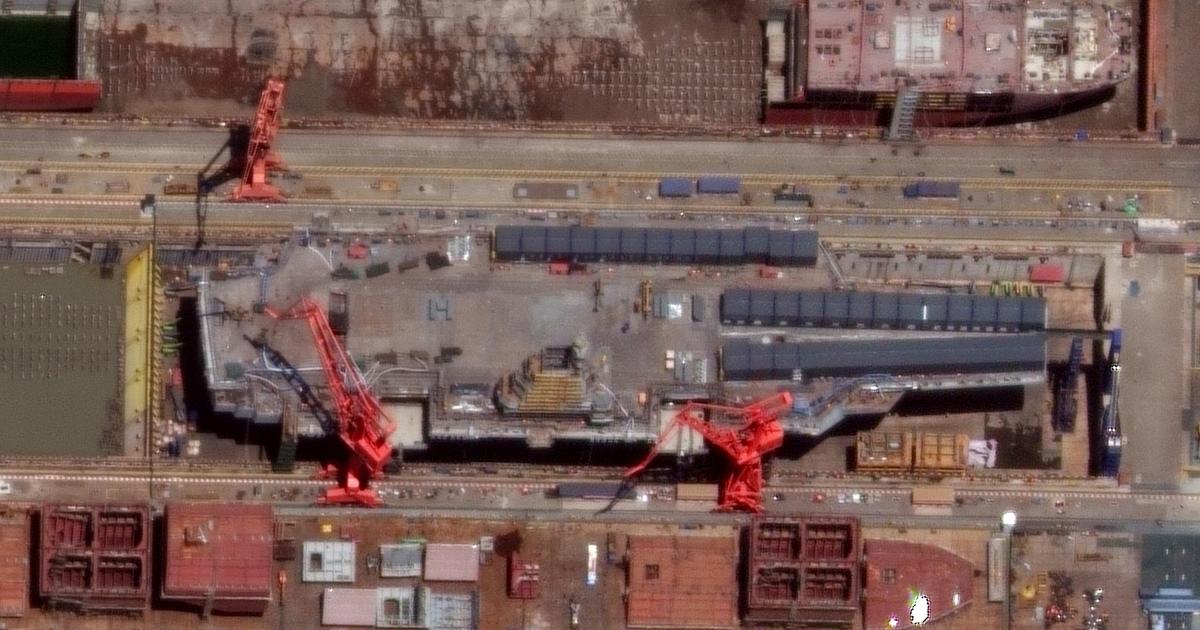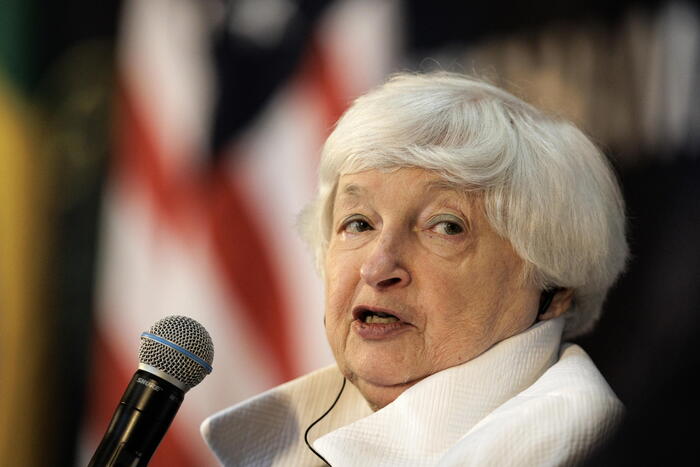Taiwan Crisis: Are China and the US Leading the World With Seeing Eyes Into the Abyss?
Created: 08/08/2022 13:01
By: Sven Hauberg
Joe Biden (left), Nancy Pelosi and Xi Jinping: There is a risk of escalation in the Taiwan conflict.
© AFP/Imago (montage)
Even after the phone call between Joe Biden and Xi Jinping, the situation remains tense: China and the USA are on a confrontational course on the Taiwan question.
Munich/Beijing/Washington – In his best-selling history, The Sleepwalkers, Australian historian Christopher Clark describes how mutual distrust, misjudgments and misguided decisions led the world to World War I.
One feels a bit reminded of Clark's analysis of the pre-war years these days when one observes how the governments of China and the USA are acting on the Taiwan question.
There are threats, plans are made and promises are broken – only to then row back and pretend that nothing was meant that way.
The end could be a war over Taiwan that will end in a global catastrophe.
The Taiwan conflict has been smoldering for decades.
In 1979, the USA announced that it would no longer recognize the Taiwanese government, but rather the communist People's Republic of China.
At the same time, Washington pledged to supply the Taiwanese with weapons for self-defense.
Beijing regards Taiwan as a "renegade province" and is threatening to conquer the now democratically governed country.
For decades, the US position on the Taiwan question seemed clear: there is only one China, and its government is in Beijing;
only informal relations are maintained with Taiwan.
It was always left open whether Taiwan would be supported in the event of a Chinese attack – this policy of ambiguity is called “strategic ambiguity”.
China and Taiwan: That's what the conflict is about
View photo gallery
China and the US: Another definition of Taiwan's status quo
Anyone who reads the transcripts of the conversation between US President Joe Biden and Chinese President Xi Jinping on Thursday comes to the conclusion at first glance that nothing has changed.
"Xi stressed that the historical context of the Taiwan issue is clear and unambiguous, and that the two sides of the Taiwan Straits belong to the same China and the status quo is unambiguous," the Chinese side said.
And the Americans read: "Regarding Taiwan, President Biden stressed that United States policy has not changed and that the United States is making unilateral efforts to change the status quo or restore peace and stability in the Taiwan Strait." to undermine, resolutely reject.”
But when Xi Jinping talks about the "status quo," he means: Taiwan belongs to China, and that must never change.
What Joe Biden says goes beyond that: Yes, Taiwan is part of China, he says.
But in fact, the Taipei government makes its own decisions;
The country may only be annexed to the People's Republic of China if the people of Taiwan also want it.
And it doesn't look like that at the moment.
For Biden, forcibly annexing China would be a violation of the much-vaunted status quo.
China's Communist Party, on the other hand, considered it a "historic task" to "reunite" Taiwan and the mainland.
Biden has repeatedly publicly questioned his administration's "strategic ambiguity" in recent months, claiming that Washington has an obligation to stand by the Taiwanese in the event of a Chinese attack.
Subsequently, the White House always tried to put Biden's statements into perspective.
A Sisyphean task.
Last November, the US President even claimed that Taiwan was “independent.
It makes its own decisions.” That may be factually true, but it is precisely the kind of rhetorical sophistication that makes Beijing politicians blush.
China provokes - and creates facts in the South China Sea
But Beijing is also provoking.
Hundreds of fighter jets have penetrated Taiwan's air defense zone since the beginning of the year.
In addition, China declared that the Taiwan Strait - the strait between the People's Republic and Taiwan - is not international waters.
Tensions are also growing in the South China Sea: Just a few days ago, Beijing's state television reported that China had permanently stationed personnel on three of the disputed Spratly Islands.
In addition to China, Taiwan, the Philippines, Malaysia, Vietnam and Brunei also claim all or part of the islands.
The US aircraft carrier Ronald Reagan is currently in the region.
His declared goal: a “free and open Indo-Pacific”.
also read
While Putin is talking to Erdogan: Bloodhound Kadyrov is meeting with Turkey's foreign minister and head of the secret service
"War on Russia"?
Linke managing director warns Wagenknecht – and emphasizes “factual arguments”
As if the situation between the two nuclear powers wasn't already tense enough, another disruptive factor recently emerged: According to a media report, Nancy Pelosi, the speaker of the US House of Representatives, is planning a trip to Taiwan at the beginning of August.
Pelosi is number three in the US political hierarchy;
the last time Taipei had received such a high-ranking visitor from the USA was 25 years ago.
Back then, in 1997, China was not yet the self-confident superpower it is today.
In addition, Pelosi is particularly hated in Chinese politics.
She regularly criticizes Beijing for human rights violations in Xinjiang, Tibet and Hong Kong.
"Whoever plays with fire gets burned," Xi Jinping repeated in his phone call with Biden, a phrase that had already been used in a similar context in the spring.
Quite possible,
Pelosi has put their President in an impossible position.
He cannot forbid her to visit, that would go against the principle of the separation of powers and would also make him look weak.
Because the Republicans are also taking a tough anti-China course.
Biden cannot approve of the trip either;
that would only anger China more.
Nancy Pelosi's Taiwan plans provoke China - and leave questions unanswered
Pelosi herself has so far neither confirmed nor denied her trip to Taiwan – probably for security reasons.
The fact that she does not speak publicly about her plans leads to the problem that one does not know what she actually wants to achieve.
Sure, she wants to express her support for Taiwan.
But would this visit really help the Taiwanese?
Or would he be the proverbial straw that breaks the camel's back in Beijing?
At best, Pelosi's visit to Taiwan would be little more than symbolic politics.
In the worst case, however, it would plunge the entire region and perhaps even half the world into catastrophe.
Beijing would certainly not start a war lightly because of Pelosi's visit.
However, it is conceivable that China will take steps that could force the USA to act - with unforeseeable consequences.
Hu Xijin, one of Beijing's loudest and most influential propagandists, suggested that PLA planes accompany Pelosi's machine and cross Taiwan for the first time ever.
Pushing off the Pelosi plane is also an option.
The 82-year-old herself said the Pentagon had warned that her plane would be "shot down".
"The likelihood of a military conflict due to miscalculation is increasing," Hu wrote on Twitter.
Biden therefore emphasized to Xi how important it was to "avoid misunderstandings and misjudgments."
If the US really wants to preserve the status quo - and that would also mean peace in Taiwan - Pelosi should not go to Taipei.
And in the breather that would then arise, US policy should consider how it can carry its Taiwan and China policy into the future.
Domestically, too, there is great pressure on Biden to position himself;
vague terms like “strategic ambiguity” won't win votes.
And the China hawks - those politicians who want to tighten course against Beijing - are already waiting for their big moment.
Biden needs to be clear now, and in doing so he should not lose sight of Taiwanese longing for peace.
(sh)







